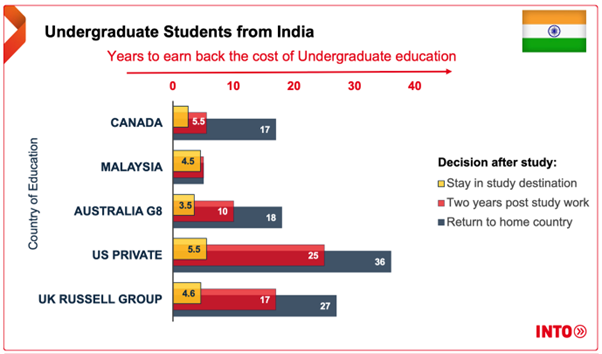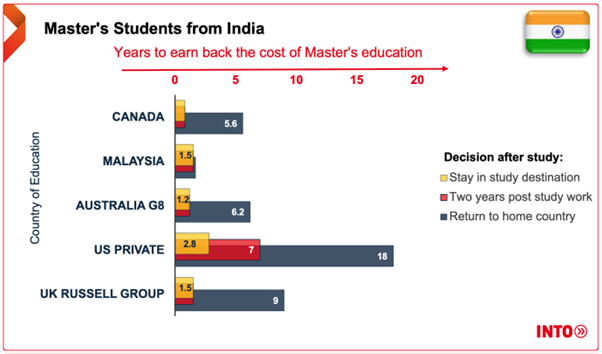Degrees of Value: How Post-Study Work Can Make or Break Return on Investment

According to a June 4th Wall Street Journal report, international students contribute over $40 billion to the U.S. economy. The article mentioned rumors of potential curbs to Optional Practical Training (OPT)—a key pathway for foreign graduates to gain work experience. In the UK, the Government has proposed reducing post study work from two years to 18 months. As our latest research shows, these adjustments threaten to undermine the very model that sustains this flow. What was once a soft benefit is now a critical pillar of financial viability.
An Indian student returning home immediately after a U.S. undergraduate degree at a private university could more than 30 years to recover the cost. Stay and work for two years post-graduation, and that figure drops by 11 years—or as little as three in Canada and Australia. For Chinese graduates, a stint of post-study work can cut almost six years of the payback period.1
Across scenarios, students who can work after studying earn back their investment much faster than those who cannot. The economic impact is undeniable—and increasingly, unavoidable.
CHINA:

1 These figures are based on average graduate salaries in the relevant countries and allow for taxation at prevailing rates – our research team is happy to share more.

- Return home: Students returning to China immediately on graduation would need to work for almost 14 years to earn the equivalent cost of a three year undergraduate Russell Group education (including living expenses), and for four years less, if they took advantage of two year post study work visa university. Masters students who return home immediately can earn the total cost of a one year Masters in around 4.6 years and almost half that time if they do some post study work in the UK.
- Two years post-study work: The same undergraduate student who works in a graduate level job in the UK and then returns home can cut almost five years off the repayment term, earning the equivalent back in just under four years.
INDIA


- Return home: Students returning to India immediately on graduation would need to work for 14 years to. earn the equivalent cost of a three year undergraduate Russell Group education (including living expenses), and for two years less, if they studied at a non-Russell Group university. Masters students who return home immediately can earn the total cost of a one year Masters in just under five years.
- Two years post-study work: The same undergraduate student who works in a graduate level job in the UK and then returns home can cut more than eight years off the repayment term, earning the equivalent back in just under five and a half years.
But universities cannot rely on immigration policy alone to make education affordable. Reducing fees may not be fiscally viable. Instead, institutions must rethink delivery. Offshore degrees, hybrid models, and transnational partnerships offer students the chance to begin their studies at home—at lower cost—and finish overseas, gaining the international exposure and credentials employers value most.
These shifts are happening at pace An opinion piece in the Times Higher Ed Supplement by Dr Cheryl You points to “more students are opting for in-country pathways, such as foundation programmes or 2+2 joint degree arrangements between Chinese and Western universities, as more practical and supportive alternatives. In addition, they are increasingly looking beyond traditional overseas study destinations to closer-to-home alternatives, such as Hong Kong, Macao or elsewhere in Asia.”
And, as for post-study work, it is a critical part of the offer for students. It is not a pathway to permanent migration nor a drain on public resources. Students on post study work in the UK pay an additional surcharge to use NHS services for example. A period of post study work makes a world class education more affordable for students and provides the receiving country with a valuable talent pipeline – especially in areas where there are major labour shortages – especially in the technology and AI from which growth will come.
For universities and policymakers alike, the message is clear: ROI is no longer optional. It is increasingly the global currency of trust in higher education. Mobility works best when the maths does too.
Get in touch to find out how we are support our partners to extend their reach into diversifying global talent pools – through in-country delivery and recognition partnerships.
OUR METHODOLOGY: We took average tuition fees and living expenses from each of the destination countries – per the table below. Our team then calculated graduate starting salaries – net of income tax for each of the three post graduation options. Please contact us for more detail on the methodology.